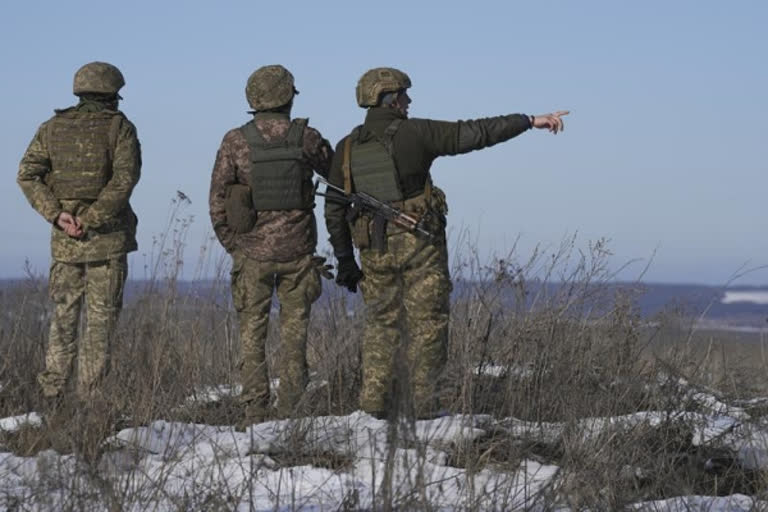Moscow: The Kremlin signaled Monday it is ready to keep talking with the West about security grievances that led to the current Ukraine crisis, offering hope that Russia might not invade its beleaguered neighbor within days as the US and European allies increasingly fear.
Questions remain about Russian President Vladimir Putin's intentions, however. And countries are evacuating diplomats and on alert for possible imminent war amid the worst East-West tensions since the Cold War. On a last-ditch diplomatic trip, Germany's chancellor said there are no sensible reasons for the buildup of more than 130,000 Russian troops on Ukraine's borders to the north, south and east, and he urged more dialogue. Britain's prime minister said Europe is on the edge of a precipice" but added, there is still time for President Putin to step back.
France's foreign minister, Jean-Yves Le Drian, told French television that all elements were in place for a strong Russian offensive, but nothing shows today that Putin has decided to launch one. Despite warnings from Washington, London and elsewhere that Russian troops could move on Ukraine as soon as Wednesday, Monday's meeting between Putin and Foreign Minister Sergey Lavrov suggested otherwise.
At the session with Putin, Lavrov argued that Moscow should hold more talks with the US and its allies despite their refusal to consider Russia's main security demands. Moscow, which denies it has any plans to invade Ukraine, wants Western guarantees that NATO won't allow Ukraine and other former Soviet countries to join as members. It also wants the alliance to halt weapons deployments to Ukraine and roll back its forces from Eastern Europe demands flatly rejected by the West.
Also Read: War, peace, stalemate? Week ahead may decide Ukraine's fate
The talks can't go on indefinitely, but I would suggest to continue and expand them at this stage, Lavrov said, noting that Washington has offered to conduct dialogue on limits for missile deployments in Europe, restrictions on military drills and other confidence-building measures. Lavrov said possibilities for talks are far from being exhausted." His comments, at an appearance orchestrated for TV cameras, seemed designed to send a message to the world about Putin's own position: namely, that hopes for a diplomatic solution aren't yet dead.
Putin noted the West could try to draw Russia into endless talks and questioned whether there is still a chance to reach agreement. Lavrov replied that his ministry wouldn't allow the US and its allies to stonewall Russia's main requests. The US reacted coolly to Lavrov's comments. The path for diplomacy remains available if Russia chooses to engage constructively, White House principal deputy press secretary Karine Jean-Pierre said. However, we are clear-eyed about the prospects of that, given the steps Russia is taking on the ground in plain sight.
US officials said the Russian military continued apparent attack preparations along Ukraine's borders. A US defense official said small numbers of Russian ground units have been moving out of larger assembly areas for several days, taking up positions closer to the Ukrainian border at what would be departure points if Putin launched an invasion. The official spoke on condition of anonymity to discuss information not publicly released. CBS News was first to report on the movement of the units.
In a phone call Sunday, US President Joe Biden and Ukrainian President Volodymyr Zelenskyy agreed to keep pushing both deterrence and diplomacy. Zelenskyy's office also quoted him suggesting a quick Biden visit would help a possibility that was not mentioned in the White House summary of the call. Such a visit would be unlikely as the US is now operating with a skeleton diplomatic staff in the capital, Kyiv.
Ukrainian security and defense council chief Oleksiy Danilov downplayed the threat of invasion but warned of the risk of internal destabilization by unspecified forces. Today we do not see that a large-scale offensive by the Russian Federation can take place either on February 16th or the 17th, he told reporters after meeting lawmakers. We are aware of the risks that exist in the territory of our country. But the situation is absolutely under control.
As if to show defiance, Zelenskyy said Wednesday would be a "day of national unity," calling on the country to display the blue-and-yellow flags and sing the national anthem in the face of hybrid threats. The country is preparing nonetheless. Kyiv residents received letters from the mayor urging them to defend your city, and signs appeared in apartment buildings indicating the nearest bomb shelter. The mayor says the capital has about 4,500 such sites, including underground parking garages, subway stations and basements.
Also Read: Ukrainian Prez discusses regional security challenges with German Chancellor
Others heeded the advice of Ukraine's leaders not to panic. Street music flooded central Maidan Square on Sunday night and crowds danced. I feel calm. You should always be ready for everything, and then you will have nothing to be afraid of, said Alona Buznitskaya, a model. During what could be a crucial week for Europe's security, German Chancellor Olaf Scholz visited Ukraine on Monday before heading to Moscow for talks with Putin on a high-stakes diplomatic foray.
After meeting Zelenskyy, Scholz urged Russia to show signs of de-escalation, and reiterated unspecified threats to Russia's financial standing if it invades. UN Secretary-General Antonio Guterres held talks with Lavrov and Ukrainian Foreign Minister Dmytro Kuleba, underlining there is no alternative to diplomacy."
(AP)



